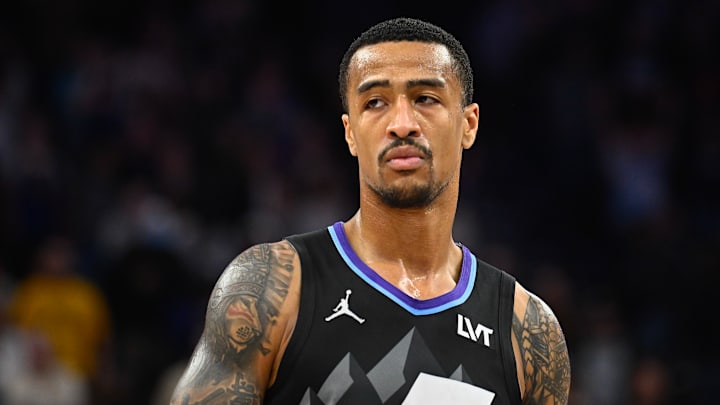The Utah Jazz were on the precipice of trading John Collins. It appeared he was Sacramento-bound until De'Aaron Fox's inconvenient imploration inadvertently intervened. Once that was settled, the Kings were out, and no other teams wanted him.
So now, the Jazz have Collins until at least this offseason. He has a player option for another $26 million next season, though it might be hard to see him passing on that. Then again, crazier things have happened. Remember the Luka trade?
No matter what he decides, the Jazz have three options for what to do with him this offseason. None of these decisions are exactly easy ones to make.
1. Let him walk in free agency
This wouldn't hurt the Jazz that much from an asset management standpoint. They didn't trade much for Collins, and he's better off playing for a team that could use what he does to aid their playoff push. That's the whole reason why the Kings really pushed for him.
Still though, Collins has been a good presence in Utah. Even after his disastrous first season with the team, he licked his wounds and came out on the other side. He played well enough that he miraculously had trade value.
Doing so would allow Utah to give more time to Walker Kessler, Kyle Filipowski, and potentially whoever they get with their lottery pick this season. However, Collins' production isn't easily replaced.
2. Trade his expiring contract
It would shock absolutely no one if Collins opts in because corralling $26 million while he has the chance is a pretty common-sense decision. If that's how things go, the Jazz would have the opportunity to deal him while his value may arguably be at its highest.
In this particular case, Collins' value would be as high as ever for reasons beyond how well he's played this season. Teams want guys as good as he is, but they also want cap flexibility. The NBA's new tax aprons make teams want talent as long as it doesn't cost them much financially long-term. Collins may cost a lot, but only for one more year.
It is rare for trade partners to acquire someone as good as Collins while also having the option of staying financially flexible with his deal expiring in 2026. The Jazz could also benefit from this.
3. Give him an extension
One may say, "Collins was once considered among the worst albatross contracts in the NBA! Why make that potentially worse?" The answer to that would be the Jazz wouldn't in this case, even if they gave him an extension.
Collins is a fantastic player. He'll never make an All-Star team, but there's a reason why the Kings believed he would have helped their playoff aspirations. No, he shouldn't be given another contract like the one the Hawks gave him, but he should be paid handsomely for what he does.
The Jazz could extend him another year on his current contract, being paid around the same as his current contract does. They would do that, believing he'd have a strong trade market again. Or they could give him a longer contract that may not pay as much but is still good money for him.
That might work out for all sides because players like Collins are getting squeezed out by the current CBA. It's designed to primarily pay the top stars a king's ransom among king's ransoms, while those who aren't stars will have to take discounts.
Collins' best bet financially might be to take a contract extension worth less than what he's been more paid but more than what the open market would be sure to give him.
If none of these options sound great, that's the point. Making a decision with someone like Collins is difficult for a team that doesn't really need him like the Jazz, and simultaneously, won't be so easy to replace.
